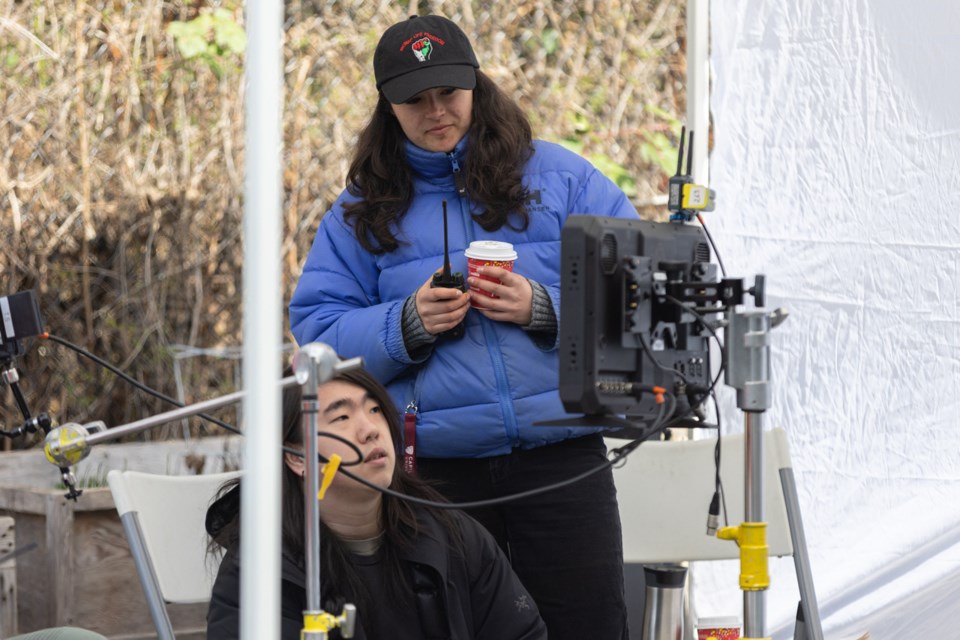Like so many second- and third-generation children of immigrants, Roshan Beaven has always felt a certain disconnection from her heritage. Growing up in Whistler, the 22-year-old was close to her Iranian-born grandparents, but with so few other Persians around, her exposure to the culture of her homeland was limited.
Then, she left the bubble to pursue filmmaking at Capilano University in North Vancouver, which has long been home to a vibrant Iranian community, and moved in with her grandma, who lives close to campus.
“Living with her the past four years has really been a huge help in connecting me to my culture,” she says. “Coming here, it was just amazing to realize, ‘Wow, there are so many people that have the situation that I do and understand what it’s like to feel disconnected.’ That helped me with this project as well.”
That project, a 10-minute short film called Spare Some Change that is screening at the Whistler Film Festival (WFF) next week, follows Ali, fresh off his arrival in Vancouver amidst the rising political turmoil in 1978 Iran. Ali must quickly get over his distrust of a young female journalist he meets after learning his wife may have been killed in the Cinema Rex fire, a real-life terror attack that claimed the lives of roughly 400 people and ultimately triggered 1979’s Iranian Revolution.
The original script Beaven was working on was an entirely different story set in Vancouver’s Downtown Eastside. It wasn’t until she started hearing her grandparents’ stories from pre-Revolution Iran, along with the passing of her beloved grandfather, that she was convinced the film should pay homage to her Iranian roots in some way.
“I wanted to write something that honoured my grandparents and their history. My grandfather had passed away that year I started writing it, and I remember so many stories they were telling me,” she recalls. “They moved out here before the revolution and I remember thinking how horrifying it must have been to see your country go in a direction you’re not happy with, and to make that decision to leave before it really got bad. I wanted my main character to have that same foresight.”
Filming the short entirely in Farsi offered its own form of education for Beaven, who can mostly understand the language conversationally, but is far from fluent. She wrote the first draft in English, getting family members to translate, but she still had no way of knowing if what they came back with was true to the letter of her original script. Eventually, she tapped an Iranian classmate who, along with editing the film, completed the script’s translation, even accommodating for regional accents and vernacular.
“His family was actually from the town, Abadan, where the Cinema Rex was, so he had a really personal connection to the script as well,” Beaven says.
There were other cultural elements Beaven had to iron out to ensure she was accurately capturing late-’70s Iran, when Iranians enjoyed relative cultural freedom under the Shah, if not political freedom.
“I had originally written that all the women in the script, except the journalist, were wearing headscarves or chador. Then after speaking with the actors, they told me, in the ’70s, no one wore chadors,” explains Beaven. “I learned a lot about what it was like back then and it was nice to have their input. I didn’t want to reinforce any stereotypes of Iran being so oppressive, because it was a really different place before [the revolution].”
Although she wrote it the year before, Beaven’s film is timely given the mass protests against the Iranian state—the largest since the 1979 revolution—following the September 2022 death of Mahsa Amini, who was arrested for allegedly violating the country’s mandatory hijab law by wearing it “improperly” while visiting Tehran. She was severely beaten and died in police custody.
“It added a lot more to it, to have the added modern context of what was going on. I think a lot more people could relate to it and understand what the struggle was back then because they see what the struggle is now—and it’s a lot of the same issues,” Beaven says.
Spare Some Change screens at the Maury Young Arts Centre on Nov. 30 at 2:30 p.m., as part of the WFF’s BC Student Shorts program. Learn more at whistlerfilmfestival.com.




